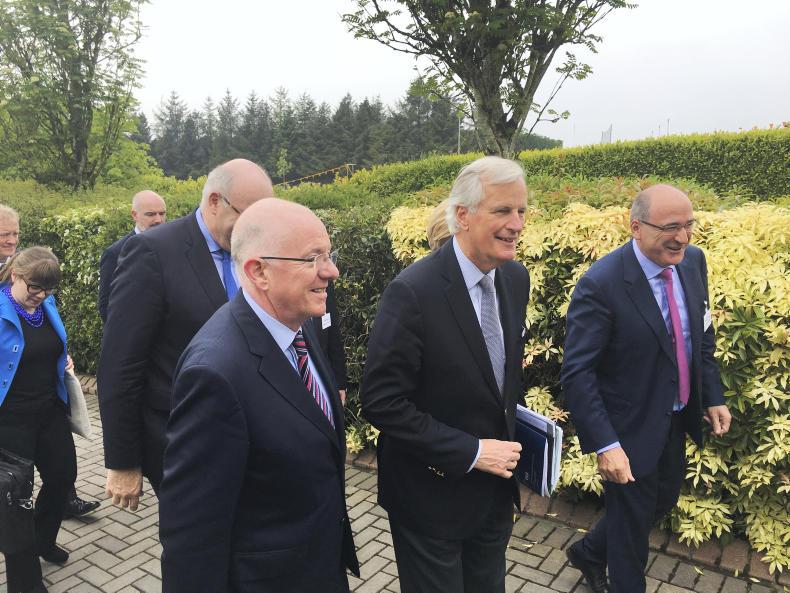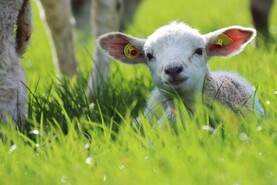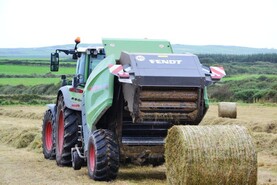The EU Chief Brexit negotiator Michel Barnier spent the final leg of his Irish visit on a trip to the border counties, much of which was in private, away from the glare of publicity. His only media engagement was after meeting with industry that will be most affected in the border region, hosted by Michael Hanley, CEO Lakeland Dairies.
Listen to an interview with Michael Hanley in our podcast below:
Listen to "Michael Hanley at Brexit border visit" on Spreaker.
The most interesting element of the visit was that it was initiated by Barnier himself. This suggests that he is particularly engaged with the unique difficulties post-Brexit that will accrue on the island of Ireland. The UK Government has also said it doesn’t want a hard border. So dealing with the Irish border sounds like one of the few areas where there appears to be goodwill between both sides of the negotiation.
Even with goodwill regarding the Irish border between the EU and UK, the mechanism currently doesn’t exist to make any arrangement that is outside the EU27. The notion that there could be a side deal negotiated between the UK and Ireland is a non-starter and that is now widely accepted. The negotiation will be between the EU27 and the UK.
However, the recognition that Ireland is unique among the EU27, with exposure to the UK amounting to over 19% of all EU tariffs on just 5% of all EU sales, means a unique solution will have to be found. No existing structure such as the arrangement for Northern Cyprus being treated as the same as the rest of Cyprus applies because Northern Cyprus isn’t recognised internationally, and Northern Ireland is universally recognised as part of the UK.
Ideally, we would continue with free trade both ways post-Brexit, with the UK remaining in the customs union. If this isn’t possible, we need to look at a special arrangement. If the UK leaves the customs union, border checks are inevitable and the benefit of access for Ireland is reduced.
While the structures aren’t in place at present to create a bespoke solution for agriculture on the island of Ireland, there is no reason why they cannot be created to facilitate trade. The big problem areas are Irish beef and cheddar sales to the UK and access for Northern Ireland to the Republic of Ireland for live sheep and milk. If the UK, EU and Ireland were agreeable to treating produce that originated in Northern Ireland as either Irish or UK origin, that would effectively give a pass to Northern Ireland produce to continue existing trade with the Republic of Ireland. It would require a modification of country of origin labelling (COOL) but if the desire is in place to do so, then it could be done.
Northern Ireland would continue to trade with the rest of the UK on the same basis as any other UK region. Any arrangement would be confined to Northern Ireland only, not the rest of the UK. Northern Ireland has been somewhat unique in the UK historically in that it had its own veterinary department within the Northern Ireland Department of Agriculture with considerable autonomy, including access to international export markets in the late 1980s and early 1990s that wasn’t available to the rest of the UK.
In return, a special arrangement would have to be found that would give Ireland access to the UK market for the commodities that it is particularly dependent on that market for. This would include beef, cheddar and pigs going north for processing, plus other smaller but locally important categories such as mushrooms. While it might be argued that there is no way the EU27 would accept this favoured status for Ireland, there are two responses. The first is that the Irish border is identified as a priority for the EU27 in negotiations. Secondly and perhaps even more importantly, this arrangement would prevent the Irish problem with beef from becoming an EU27 problem as it is the EU27 that would be the destination for 250,000t of beef that couldn’t be viably sold in the UK with a WTO tariff.
The logistics of arriving at an arrangement like this would be huge. However, with the separate traceability system in Northern Ireland, product identification shouldn’t be the issue. They will of course have to maintain EU standards anyway if they want to trade with the EU so that needn’t be an issue.
Irish produce
As for allowing Northern Ireland produce to be treated as Irish, it is impossible in present structures but they can be changed. After all, Bushmills whiskey is allowed to carry the description Irish whiskey and Baileys Irish Cream talk about 75% of ingredients coming from the “island of Ireland”. The quid pro quo would have to be in giving the Republic of Ireland access to the UK on current terms irrespective of what arrangement is made for the rest of the EU27. Their benefit would be not having to accommodate what would effectively be “refugee” Irish agricultural products that would seriously disrupt the EU market.
Everything about Brexit is uncharted territory for both the EU and UK, and if the stated goodwill of both parties to the island of Ireland is to be tangible, an imaginative solution to retain the status quo for agriculture has to be found.
Read more
Full coverage: Brexit
The EU Chief Brexit negotiator Michel Barnier spent the final leg of his Irish visit on a trip to the border counties, much of which was in private, away from the glare of publicity. His only media engagement was after meeting with industry that will be most affected in the border region, hosted by Michael Hanley, CEO Lakeland Dairies.
Listen to an interview with Michael Hanley in our podcast below:
Listen to "Michael Hanley at Brexit border visit" on Spreaker.
The most interesting element of the visit was that it was initiated by Barnier himself. This suggests that he is particularly engaged with the unique difficulties post-Brexit that will accrue on the island of Ireland. The UK Government has also said it doesn’t want a hard border. So dealing with the Irish border sounds like one of the few areas where there appears to be goodwill between both sides of the negotiation.
Even with goodwill regarding the Irish border between the EU and UK, the mechanism currently doesn’t exist to make any arrangement that is outside the EU27. The notion that there could be a side deal negotiated between the UK and Ireland is a non-starter and that is now widely accepted. The negotiation will be between the EU27 and the UK.
However, the recognition that Ireland is unique among the EU27, with exposure to the UK amounting to over 19% of all EU tariffs on just 5% of all EU sales, means a unique solution will have to be found. No existing structure such as the arrangement for Northern Cyprus being treated as the same as the rest of Cyprus applies because Northern Cyprus isn’t recognised internationally, and Northern Ireland is universally recognised as part of the UK.
Ideally, we would continue with free trade both ways post-Brexit, with the UK remaining in the customs union. If this isn’t possible, we need to look at a special arrangement. If the UK leaves the customs union, border checks are inevitable and the benefit of access for Ireland is reduced.
While the structures aren’t in place at present to create a bespoke solution for agriculture on the island of Ireland, there is no reason why they cannot be created to facilitate trade. The big problem areas are Irish beef and cheddar sales to the UK and access for Northern Ireland to the Republic of Ireland for live sheep and milk. If the UK, EU and Ireland were agreeable to treating produce that originated in Northern Ireland as either Irish or UK origin, that would effectively give a pass to Northern Ireland produce to continue existing trade with the Republic of Ireland. It would require a modification of country of origin labelling (COOL) but if the desire is in place to do so, then it could be done.
Northern Ireland would continue to trade with the rest of the UK on the same basis as any other UK region. Any arrangement would be confined to Northern Ireland only, not the rest of the UK. Northern Ireland has been somewhat unique in the UK historically in that it had its own veterinary department within the Northern Ireland Department of Agriculture with considerable autonomy, including access to international export markets in the late 1980s and early 1990s that wasn’t available to the rest of the UK.
In return, a special arrangement would have to be found that would give Ireland access to the UK market for the commodities that it is particularly dependent on that market for. This would include beef, cheddar and pigs going north for processing, plus other smaller but locally important categories such as mushrooms. While it might be argued that there is no way the EU27 would accept this favoured status for Ireland, there are two responses. The first is that the Irish border is identified as a priority for the EU27 in negotiations. Secondly and perhaps even more importantly, this arrangement would prevent the Irish problem with beef from becoming an EU27 problem as it is the EU27 that would be the destination for 250,000t of beef that couldn’t be viably sold in the UK with a WTO tariff.
The logistics of arriving at an arrangement like this would be huge. However, with the separate traceability system in Northern Ireland, product identification shouldn’t be the issue. They will of course have to maintain EU standards anyway if they want to trade with the EU so that needn’t be an issue.
Irish produce
As for allowing Northern Ireland produce to be treated as Irish, it is impossible in present structures but they can be changed. After all, Bushmills whiskey is allowed to carry the description Irish whiskey and Baileys Irish Cream talk about 75% of ingredients coming from the “island of Ireland”. The quid pro quo would have to be in giving the Republic of Ireland access to the UK on current terms irrespective of what arrangement is made for the rest of the EU27. Their benefit would be not having to accommodate what would effectively be “refugee” Irish agricultural products that would seriously disrupt the EU market.
Everything about Brexit is uncharted territory for both the EU and UK, and if the stated goodwill of both parties to the island of Ireland is to be tangible, an imaginative solution to retain the status quo for agriculture has to be found.
Read more
Full coverage: Brexit






 This is a subscriber-only article
This is a subscriber-only article










SHARING OPTIONS: